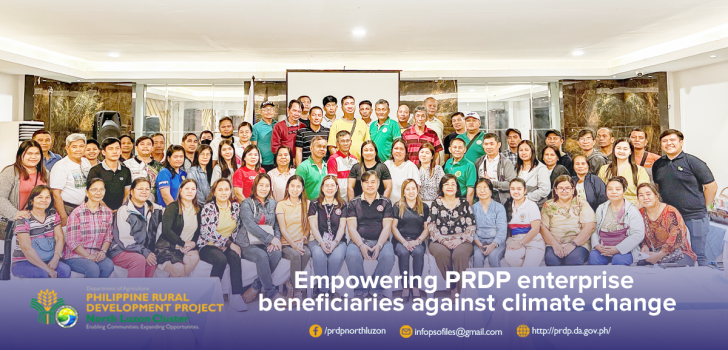
Empowering PRDP enterprise beneficiaries against climate change
Disaster risk reduction (DRR) is of paramount importance in agriculture in the Philippines, and the Central Luzon region is no exception. Typhoons, floods, and droughts; these events can have devastating effects on crops, livestock, and agricultural infrastructure.
Worsened by the adverse effects of climate change, the country’s agriculture sector is particularly vulnerable to these disasters, due to its dependence on natural resources and the predominance of small-scale farmers.
To help prepare its beneficiaries for the impending effects of climate change, the Department of Agriculture – Philippine Rural Development Project (DA-PRDP) Central Luzon I-REAP Component gathered enterprise subproject proponent groups to the Disaster Risk Reduction and Management and Business Continuity Plan training in November 2023 in Tarlac City, Tarlac.
Speakers from the Tarlac Provincial Disaster Risk Reduction and Management Office, Office of Civil Defense, and the DA RFO III discussed climate change, forming a disaster control group, disaster resiliency, and business continuity planning.

DA RFO III Agricultural Center Chief Lowell Rebillaco
According to the DA RFO III Agricultural Center Chief Lowell Rebillaco, the extreme weather conditions brought by climate change greatly affects the agriculture in the region.
“As we’ve seen with the recent typhoons getting stronger, they have triggered flooding in several provinces such as Pampanga, Bulacan, and Bataan. On the other hand, our country’s weather bureau has predicted an El Nino where the extreme heat could affect not only our crops but our livestock as well,” Rebillaco said.
Integrating DRR into agricultural practices supports sustainability. By taking on resilient farming methods, farmers in the region can better endure the impacts of disasters and adapt to changing environmental conditions. “It would be ideal that our farmers are empowered against climate change. In other words, they should be able to respond to the effects of climate change and establish resiliency,” Rebillaco added.
Business Continuity Planning (BCP) was also taught to help the beneficiaries keep their enterprises afloat amidst the worsening weather conditions and disasters. This plan would also aid in the recovery of critical business functions from adverse conditions. ### (By Ram Bautista, RPCO 3 InfoACE Unit)
